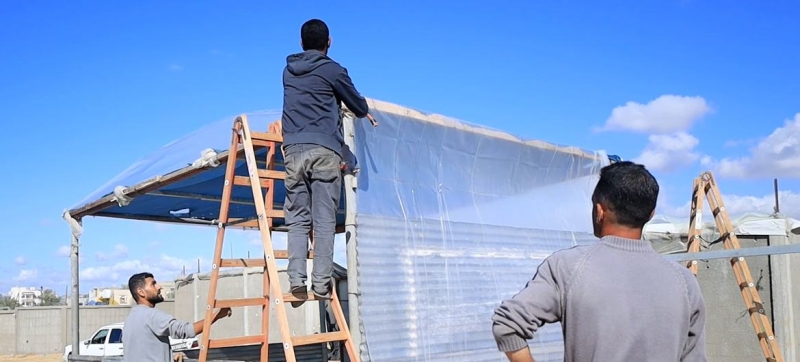
Displaced people are building new temporary housing in Al-Mawasi. Gaza: Without fuel supplies, the enclave’s humanitarian and medical systems will collapse Peace and Security
The Israeli military operation in Rafah continued on Friday. UN humanitarian agencies have therefore renewed calls for a ceasefire to prevent further bloodshed and restore desperately needed aid supplies.
“As Israeli forces intensify their bombing of Rafah, forced displacement continues,” the UN agency for Palestine refugees (UNRWA) said. – About 110 thousand people left Rafah in search of safety. But there is no security anywhere in the Gaza Strip, and living conditions are terrible. The only hope is an immediate ceasefire.”
UN humanitarian agencies have warned that humanitarian efforts in the enclave have been paralyzed since Israeli tanks rolled into the Rafah border crossing on Monday.
The situation will worsen again if humanitarian operations will not be resumed for the next 48 hours, said Hamish Young, senior emergency coordinator for the United Nations Children’s Fund (UNICEF) in the Gaza Strip.
Attacks on the UN
UN Secretary-General Antonio Guterres strongly condemned the attack by protesters on an UNRWA facility in Jerusalem.
On Thursday, UNRWA Commissioner-General Philippe Lazzarini said that Israeli residents twice set fire to the perimeter of the agency’s headquarters. This is the second time in a week that UNRWA has been attacked during protests.
People are moving again
Most of those fleeing Rafah, following the evacuation order, are seeking refuge in Khan Younis and Deir al-Balah. However, humanitarian organizations say these areas lack the basic services needed to support civilians in need of food, shelter and medical care.
Roads to the Al-Coastal Zone Mawashi, where Gazans have been ordered to move, is overwhelmed, a UNICEF official said. Speaking from Rafah via video link to reporters in Geneva, Young described desperate scenes as families were once again displaced and hundreds of trucks, buses, cars and donkey carts continued to flee the city.
“The people I talk to tell me they are exhausted and scared, they know that life in Al-Mawasi will be incredibly hard again,” he said. – Families do not have proper sanitation, drinking water and housing. People make makeshift toilets by digging holes in the ground around their tents.”
“One of the men, the father of the family, told me that he could only offer his household bad options. And when he told me where he was going, he began to sob. His children also burst into tears and began asking me what they should do. This is a tragic situation, there is simply no safe place for children in Gaza,” Young continued.
Lack of help
“Civilians in Gaza are being starved and killed,” said UN Emergency Relief Coordinator Martin Griffiths.
In a social media post, he warned that for several days, “no one or anything was allowed to enter or leave Gaza.”
Closing of the Rafah and Kerem Shalom crossings in the south of the strip – the main routes to obtain food and water , fuel and medicine means no help, Griffiths continued.
Food unavailable
At the same time, the UN World Food Program (WFP) reported that its main warehouse in Gaza is now out of reach.
“Our main warehouse is currently unavailable. There has been no help from the southern checkpoints for two days,” WFP acting director in Palestine Matthew Hollingworth said Thursday evening.
“Only one is working bakery. Food and fuel supplies in Gaza will last only one to three days. Without them, our activities will stop,” he emphasized.
Medical services
In turn, the World Health Organization ( WHO) stated that without fuel the entire healthcare system of the enclave would collapse.
The WHO is responsible for supplying fuel to all hospitals in Gaza, but has had to suspend travel to the north so that facilities in the south of the enclave can remain open, said spokeswoman Margaret Harris.
Management The UN Coordination of Humanitarian Assistance (OCHA) reported, citing Gaza authorities, that within 24 hours a number of medical facilities will run out of fuel and they will not be able to operate.
Read also:
